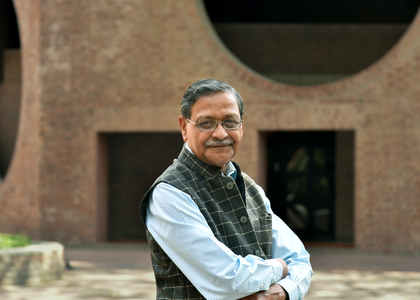IIM-Ahmedabad's Dubai campus set to redefine India's educational soft power: Institute director
By IANS | Updated: July 27, 2025 15:14 IST2025-07-27T15:05:28+5:302025-07-27T15:14:34+5:30
Ahmedabad, July 27 The Indian Institute of Management-Ahmedabad (IIM-A), one of India's most prestigious business schools, is all ...

IIM-Ahmedabad's Dubai campus set to redefine India's educational soft power: Institute director
Ahmedabad, July 27 The Indian Institute of Management-Ahmedabad (IIM-A), one of India's most prestigious business schools, is all set to launch its first international campus in Dubai this September.
The ambitious expansion, envisioned by IIM-Ahmedabad Director Bharat Bhasker in 2023, will begin operations with a one-year MBA programme and introduce two key research centres, one dedicated to case study development and the other focused on start-up incubation.
Bhasker, in conversation with IANS at IIM-A, expressed immense satisfaction over the swift execution of the plan.
"The Dubai campus is something I envisioned in 2023, and now I'm happy to see it materialise. I'll be visiting the campus next week," he shared. "We've curated the curriculum with a regional lens, drawing on case studies and business practices relevant to the Middle East and Africa."
The move comes after IIM-A signed a Memorandum of Understanding (MoU) with the United Arab Emirates (UAE) government in April this year.
The agreement, signed in Mumbai, officially established the Dubai campus in the Dubai International Academic City, making IIM-A the first among India's management institutes to set up an overseas campus.
Bhasker sees this as a moment of strategic significance not only for the institute but for India as a whole.
"While Western countries are increasingly shutting their doors to international students, India must seize the moment. Education is India's most potent soft power, and this campus is a strategic tool in building long-lasting influence," he said.
"Just as China uses its manufacturing and trade to build global influence, India must leverage its strength in quality education and its English-speaking workforce. If India wants to be the leader of the Global South, this is the way," he said.
The new campus aims to attract a wide array of students from the Gulf Cooperation Council (GCC) countries, North Africa, and the Commonwealth of Independent States (CIS). The first cohort will comprise around 40 to 50 students, with the long-term goal of scaling up to a 900-student capacity over the next decade.
According to Bhasker, Dubai was a natural choice.
"We've been offering executive education in the region for years. The familiarity and trust we've built made it a logical step forward," he said.
The launch comes at a time when global applications to MBA programmes are facing a downturn.
According to data, there was a 5 per cent reduction in applications to graduate business schools worldwide in 2023, the second consecutive year of decline.
Bhasker, however, remains optimistic about India's prospects. "The global numbers may be declining in the US or Europe, but India is different. We have a young population, a fast-growing economy, now the third-largest globally. As opportunities grow, so does the demand for skilled managers. That's where institutions like IIMA come into play," he said.
When asked what makes a good manager today, Bhasker responded with clarity: "Commitment and vision are important, but most of all, empathy. Business is often reduced to profit and loss, but empathy takes you a long way."
Looking ahead, Bhasker shared an exciting next step for the IIM-A campus: the establishment of a School of Data Science and Artificial Intelligence.
"The way we traditionally taught management doesn't work anymore. The way we teach management today is very different from the past. Today, AI, technology, and science are integral to leadership and decision-making. Management curriculum and the way institutes teach must evolve," he said.
"Being proactive is essential," he said.
The Dubai campus is not merely an international expansion; it is a strategic, future-facing initiative rooted in regional relevance, educational diplomacy, and an evolving idea of what management education should look like in the 21st century.
Disclaimer: This post has been auto-published from an agency feed without any modifications to the text and has not been reviewed by an editor
Open in app